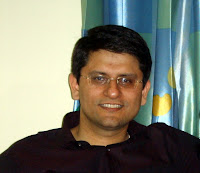Thursday, December 14, 2006
Does I deserve to be called an ARCHITECT ?
When a IT professional deserves to be called an Architect? I am trying to list down few attributes of an Architect. I am not trying to find specific attributes for product, business, information, technical, software, specialist, application, system architects and whatsoever.
Its a fare trial to find out generic attributes, when a software professional is mature enough to be called an Architect.
1) When everyone around is in hurry to find the solution. Architect understands the problem first, its origin and future roadmap. See things from 10,000 ft. Afterwards, comes up with solution with blink in his mind. Its time to build consensus around the solution.
2) It is not based on number of years of experince. It is based when you start thinking at abstract level with very ambiguous information. You don't complain that information is not enough to take decision and try to dig it out.
3) He keeps track of emerging technologies. Understand when they are ready for enterprise.
4) He follows process and influence others to follow process. Believes in quality of work.
5) He is capable of taking difficult decisions on behalf of others and have courage to own it.
6) Able to understand, create and communicate the solution to team in their language (most of time UML/patterns).
7) He understands the concepts and principles of loose coupling, high cohesion, abstraction, encapsulation, information hiding, polymorphism. All these are independent of technology used in project.
Its a fare trial to find out generic attributes, when a software professional is mature enough to be called an Architect.
1) When everyone around is in hurry to find the solution. Architect understands the problem first, its origin and future roadmap. See things from 10,000 ft. Afterwards, comes up with solution with blink in his mind. Its time to build consensus around the solution.
2) It is not based on number of years of experince. It is based when you start thinking at abstract level with very ambiguous information. You don't complain that information is not enough to take decision and try to dig it out.
3) He keeps track of emerging technologies. Understand when they are ready for enterprise.
4) He follows process and influence others to follow process. Believes in quality of work.
5) He is capable of taking difficult decisions on behalf of others and have courage to own it.
6) Able to understand, create and communicate the solution to team in their language (most of time UML/patterns).
7) He understands the concepts and principles of loose coupling, high cohesion, abstraction, encapsulation, information hiding, polymorphism. All these are independent of technology used in project.
Subscribe to:
Post Comments (Atom)
"That man is successful who has lived well, laughed often, and loved much; who has gained the respect of the intelligent men and the love of children; who has filled his niche and accomplished his task; who leaves the world better than he found it, whether by an improved poppy, a perfect poem, or a rescued soul; who never lacked appreciation of earth's beauty or failed to express it; who looked for the best in others and gave the best he had." - Ralph Waldo Emerson



No comments:
Post a Comment